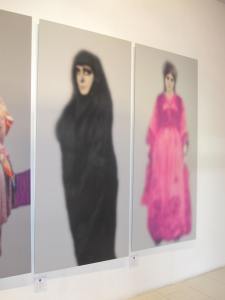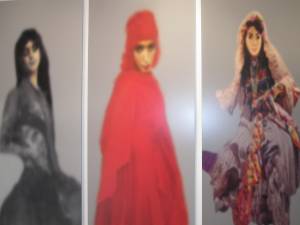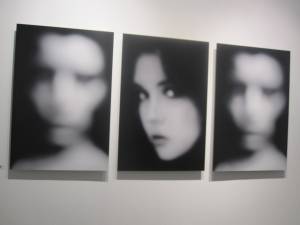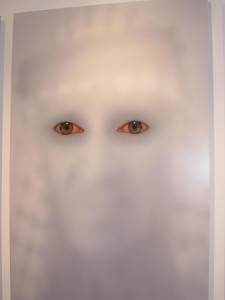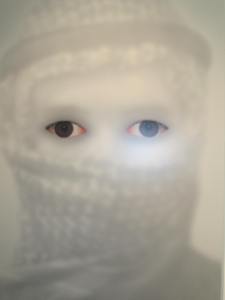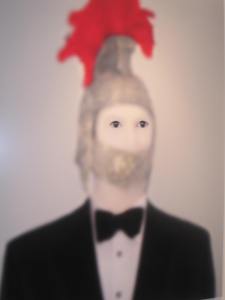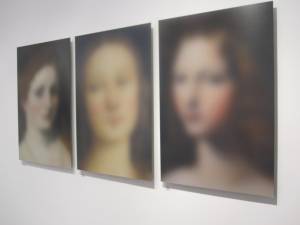Okay so many artists have stories behind them but this is one I particularly like and I’d love to invest in one of these pieces;
You could say that Iraqi artist Halim Al Karim is an interrupted being. You wouldn’t blame him, after all he was forced to spend three years living alone in a hole in the ground covered by rocks since he opposed Saddam’s regime during the Gulf war.
Throughout that time his only interaction with the outside world was through a Bedouin woman who brought him food and water on occasion and thus kept him alive.
Al-Karim has since emigrated to America and is currently living in Dubai, however, these events have had a profound effect on his life and form the basis for his art practice. He found in art the unconditional freedom to express himself.
He says; ‘My works dwell on the evolving mentality of urban society. I am concerned with ongoing and unresolved issues, especially as they relate to violence. I search through layers of collective memory and my personal experiences in that context. In this process the main challenge for me is to identify and stay clear of the historical and contemporary elements of brainwashing. Through these works I try to visualize an urban society free of violence. The out of focus images, imply an uncertainty of context, time and place. These techniques, which have become the hallmark of my work, are means to overcome the effects of politics of deception and, in turn, transform me and the camera into a single entity, seeking a greater truth.’
His work touches on the insecure state of many Iraqis living between the permanent and temporary; between reality and illusion. With over 30 years of dictatorship and surrounded by violence the people don’t know where they stand, they don’t know what their situation will be tonight or tomorrow, even the ones that have fled outside Iraq envisage and hope for a peaceful homeland to return to but don’t know if their vision is realistic.
“Being an Iraqi artist means being an artist of responsibility,” Al Karim said. “It requires vision, determination and patience to let others feel your own pain.. When I showcase my art it has to be inspired by my surroundings to mirror the situation I’m in.”
The photograph above is from his ‘urban witness’ series and relates to children of war, the emphasis on the eyes most likely reflects the horrific images that these children or ‘victims’ have witnessed. The band on the mouth may represent oppression and the fact that these beings are unable to voice the violent reality of their lives.
Al Karim’s recent exhibition ‘Baghdad 1920’ at the XVA Dubai is a take on the occupation of Iraq and the fact that history is now repeating itself. He explains: “Each photo points to history. Baghdad screams, ‘Why me! ?Why do I have to live under occupation over and over again since 1920 until 2009?’ Such unfairness is totally rejected. And through an artistic dialogue I confront history. My lens holds the photographs -‘the proof’, and ask for it to stop. My country cannot take it any more.”
“Baghdad 1920 consists of two main series — Liberators, which means the occupiers because they always invade countries under the umbrella of ‘liberation’, and Witnesses from Baghdad, which refers to my people. ”
Al Karim was born in 1963 and has been living in Dubai since 2005 and constantly visits the United States where his family lives.
He got his bachelor’s degree from the Baghdad Academy of Fine Arts in Iraq. Then he joined the Gerrit Reitveld Academy in Amsterdam.
He has sold pieces of his work to the Saatchi Gallery and more recently one of his works ‘Goddess of Beirut’ which shows veiled women exposing glamorous shoes under their cover is on sale at Christie’s for an estimate of $25,000-$30,000. (http://www.christies.com/Lotfinder/lot_details.aspx?intObjectID=5305243)
As described in the lot notes ; ‘The two women’s elegance and femininity with their glamorous high heels are shadowed by the traditional black dress and their blank ghostly faces, which masks their true identity.’
Al Karim refers to women as goddesses in many of his works -a result of the impact of his harrowing experience during his youth and the woman that saved him.
Now 47, he has lost some members of his family in the war, however as he explains;
“Nobody in Iraq hasn’t lost somebody or at least part of their own character,”


